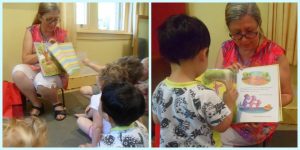 Written by Gillian Shields and illustrated by Paula Metcalf
Written by Gillian Shields and illustrated by Paula Metcalf
Macmillan children’s books, 2006. ISBN 1405022108.
Our stripy baby, written for young children, is essentially a story about embracing differences.
Get ready for a splash of colour and an imaginative tale about a family of made-up creatures with spots – the Moon family. There’s daddy Moon, mummy Moon, Zara Moon and soon to be born, baby Moon. Young readers are taken on a journey with this endearing family and Zara can’t wait for the arrival of the new baby. She tells friend Molly, “our baby will be just like your brother Max”.
“One, two, three, four”, there are now four family members but there is something wrong. Zara faces strong feelings of disappointment, sadness and even anger. Zara wants to know why baby Zack has stripes not spots. She wants to take him back.
Mummy Moon is reassuring, “He’s our baby”, and Daddy Moon affirms, “He’s got a lovely smile”. Zara is sad and cuddles Mummy Moon. Why is her brother different? At the park Zara thinks people might stare and so she doesn’t even want to play. Attempts to change Zack by wrapping him in a long spotty scarf lead to frustration. Mummy Moon and Daddy Moon explain he is beautiful. They don’t want to change Zack. He is just different.
“One, two, three, four”, there are now four happy people in the Moon family. The story finishes with reassurance and a new beginning. Zara discovers more about Zack and finds a way to show she’s sorry. She draws something that looks like Zack’s beautiful stripes – a rainbow.
I recently read Our stripy baby to a group of young children at story time, they clearly enjoyed the warm illustrations and comforting family theme. This picture book features an engaging mix of single and two page illustrations filled with colour, humour and gentle expression. Children found it fun to count with repetition “one, two, three, four” and look for the Moon family. Among the group were two children who didn’t have long to wait for a new baby in their families and so the child care teacher had much to chat about with the children afterwards.





